Chris Strachwitz 1960 Blues Article
In 1960 Chris Strachwitz was running a small mail order record service and newsletter called the International Blues Record Club (IBRC). In the summer of 1960 he took the first of many trips that would start his long career as a “song catcher”. This article for the IBRC bulletin was written shortly after his return to California where he would issue the first Arhoolie Record number F1001 “Mance Lipscomb – Texas Sharecropper and Songster”. The photos were all taken by Chris Strachwitz but did not appear in the original mimeographed newsletter.
You can also read about his 1962 trip by clicking here….
Down South 1960 – The beginning of a record label.
International Blues Record Club Bulletin No. 3
1960
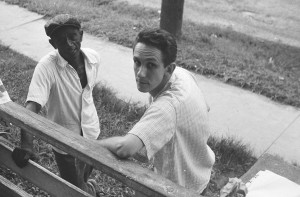
(photo by Chris Strachwitz. All rights reserved)
Now that all the business aspects have been put away I like to tell you something about the trip which I took this summer covering Texas, Louisiana, and Mississippi, and Memphis, Tenn. I left cool California with a friend Bob Pinson, quite an authority in the hill-billy record field, and we slowly made our way to Texas, after breaking down in some lonely place in Arizona. Fortunately from then on my old 1951 Plymouth made the remaining 1200 miles of the trip without any further complications. Ft. Worth was our first stop and after making a few contacts I was put on the trail of a singer known as Little Brother, but had no success in locating him. On we went to Dallas where Bob, after some research in the Public Library, came up with an address for Little Son Jackson. Of course it was the wrong address but after some time asking around we found him and soon found out that he had quit the music business some years ago but finally consented to record for me for a rather stiff fee, however he needed time to practice and we set a date. I left Bob with his relatives and went on to Houston. An unusual flood had just hit Houston a few days before and highways around Houston, if not closed, were bordered by water and the turtles considered it their highway. Lightning told me later I should have brought some of the big ones with me and he would have fixed a good soup, but humane as I am, I tried my best to avoid hitting them. Many areas of Houston were still under water but Mack McCormick was a fine host and we soon went off to do some “hunting” around town – wanted to talk to Leroy Erwin who made a wonderful record for Gold Star – but he proved to be a very busy band leader and we could never catch him at home.
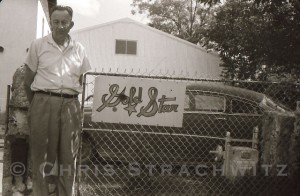
(photo by Chris Strachwitz. All rights reserved)
I had a long talk with Bill Quinn who was responsible for all the good blues on Gold Star – at least he put them out – Lightning Hopkins was his big talent scout. I found Bill a very nice and interesting man who told many an anecdote about Lightning, Lil Son Jackson, and his big seller Harry Choates. We visited many musicians and heard Lightning Hopkins accompanied by his fantastic drummer Spider Kilpatrick, a small, thin man who generates unbelievable amounts of energy when behind those drums. Spider is a very religious man and drums usually at his sanctified church. On that particular evening Lightning was in a very jumpy mood and played one boogie after the other.
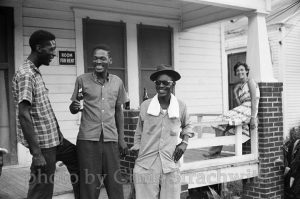
(photo by Chris Strachwitz. All rights reserved)
A few weeks later I saw him again with drummer L.C. Williams and both were in a real low down blues mood with L.C. doing all the singing – and he sounds very much like Lightning when they are together. It is really quite amazing how many different sides there are to Lightning. On a concert stage he assumes an entirely different character, if I can make this judgement from hearing some of the tapes recorded at a Houston folk concert, but he is a man who deserves a separate story.
I also heard the unbelievably loud band of Clifton Chenier who despite his brothers insistence would not sing a single french or cajun number. It was Lightning’s night off and he went with us but the noise was even too much for him and Clifton’s brother.
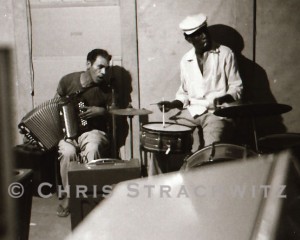
(photo by Chris Strachwitz. All rights reserved)
We also heard some Zydeco bands which are very numerous around Houston usually consisting of accordion and drums, but often also have fiddle, washboard, and the personnel in any one club might change four times during an evening. The music becomes a bit monotonous and just goes on and on, except for popular blues numbers which are given that Cajun touch.
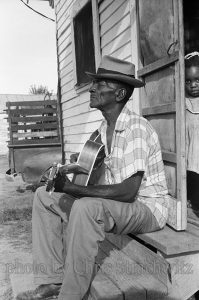
(photo by Chris Strachwitz. All rights reserved)
The next day Lightning, reluctant and nervous, departed for the West Coast – he had to fly – and another song was born. Mack had the good idea to do some searching around the Brazos valley region – and we took off for that general area. After many stops and inquiries we finally came to the county seat where we discovered Tom Moore and brothers had offices there. I imagine many readers are familiar with the song about Mr. Moore (recorded by Lightning Hopkins) which of course does not picture him as an angel. We had a very interesting talk with Mr. Moore who owns most of the land in the surrounding areas. Indirectly he also put us on the trail of the man who will be featured on the first Arhoolie release, Mance Lipscomb. Mance is known around that area and is still a very active performer at week-end dances, ball games, and out-door gatherings of all kinds, but more about him on the album.
From Houston I left for New Orleans, driving along the bayou country of southern Louisiana where both the white and negro French speaking people still retain their own language and customs as well as their own form of music, but it is rapidly deteriorating with the juke box setting the taste patterns everywhere.
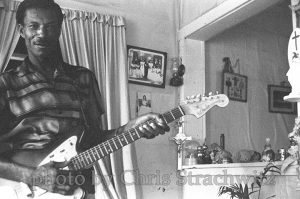
(photo by Chris Strachwitz. All rights reserved)
In New Orleans I met Ken Mills, recording for his Icon label – I heard some tapes and a few live groups, but I decided to return to the land of the blues rather than spend my time in a city where quite a few people were doing the work which should have been done long ago. I drove through Baton Rouge where I met and talked with Lightning Slim, a man with a rough blues voice but with a very short memory and little imagination, he was playing almost every night usually accompanied by Lazy Lester, a very young but sensitive harmonica player. Driving through the negro section of Scotlandville or “Scotland” as it is usually referred to by most of the people living there, I was fortunate enough to run into a very dynamic and moving street preacher who preached a little but largely sang accompanying himself on electric guitar which was plugged into an outlet at some nearby bar. But this preacher would not have been too unusual if it were not for the four little boys who accompanied him. They were standing around a second microphone chanting and shouting the congregation’s part in most of the songs while one beat fiercely on a small washboard, another played cymbals, and a third beat a tambourine, while the fourth spent most of his time running through the audience trying to collect some tokens – a real rousing version of “Jesus said it” was followed by “In a little while,” “Have you heard of the city,” “Going Home,” and “Stop and come by here.”
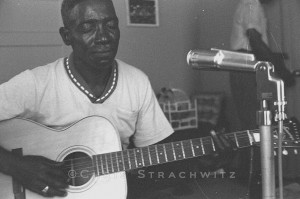
(photo by Chris Strachwitz. All rights reserved)
From Louisiana I went back through Texas, central East Texas and spent a day in Crocket where I met an interesting man who new Lightning as a young boy and lived with him for some time. He was known around Crocket as quite a guitar player but unfortunately had not played for some time and agreed to practice up a bit but unfortunately on our next trip through Crocket he vanished whenever I tried to contact him again. I only wish I had taken half a dozen guitars with me so that some of the old-timers we met who had not played for a few years, could have an instrument in their hands again. From Crocket I went through watermelon country back to Dallas where I recorded Lil’ Son Jackson, but more about him on the album notes. I also made plans to record Black Ace and after some time finally discovered the right Little Brother, after having chased around for two young fellows who were also known as Little Brother around Ft. Worth. Although I had discovered a recording by Little Brother by this time (on Star Talent) and was quite impressed, he was very disappointing when I finally heard him, but one can’t always be lucky.
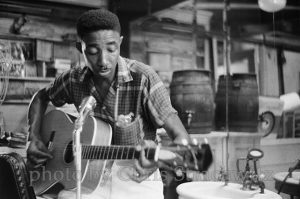
(photo by Chris Strachwitz. All rights reserved)
From Dallas I headed east through northern Louisiana – Shreveport and Monroe, but nothing unusual turned up in either place. In Jackson, Miss I met Mr. and Mrs. McMurry once heads of Trumpet Records, both very nice people and I found out a good deal about the label and some of the artists, through them I also met the pianist on most of the Trumpet recordings, David Cambell, an excellent musician, who could fit in with almost any group and he did – recording with Sonny Boy Williamson some low-down blues and cutting some real corny hill-billy stuff with some of the western artists on Trumpet. Through Mr. McMurry I also met the Hodges Brothers, who live on a little farm north of McComb, Miss. and finally recorded them – a real fine hill-billy group with fiddle, mandolin, guitar, and string bass.
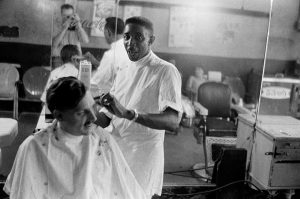
(photo by Chris Strachwitz. All rights reserved)
Since my time was running a bit short I contacted Paul Oliver in Chicago and we planned to meet in Memphis, Tenn. I went north, staying a few days in Clarksdale where I met Wade Walton without too much trouble, a wonderful person, who introduced me and later Paul and Valerie Oliver to many fine and interesting people in that rather depressed agricultural center of the Delta. Wade is a barber by profession and a very fine one, as both I and Paul can testify, but he is much more than that, he is a musician playing guitar and harmonica, but mainly he is one of those rare individuals – sincere, open, and you can’t help liking him as soon as you meet him.
Down South part II
International Blues Record Club Bulletin No. 4
Nov/Dec 1960
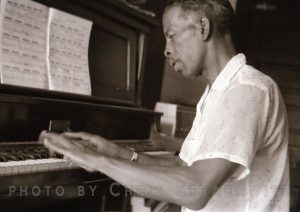
(photo by Chris Strachwitz. All rights reserved)
In Clarksdale I spent quite a bit of time with pianist Jasper Love (the cousin of Willie Love who recorded for Trumpet – passed away a few years ago). Jasper told me about a string band but unfortunately this never materialized although we later saw the leader of the group who probably once led a very active country dance band in the Delta area. From Clarksdale I took a quick trip to Memphis and contacted a Mr. Robert Henry who was going to put me in contact with almost every blues singer I was looking for – but it sounded too good to be true – which it was. I looked up various record firms – including SUN where I was told that Joe Hill Louis had passed away a few years ago – but it was only by chance that one of the men who knew him was at the office that day – no one else had ever heard of him or anyone else such as Doctor Ross – 8 years ago is antiquity for the average record company in this country. Blues Boy Kingdom still had offices on Beale St. but asking a dentist working in the building I was informed that they had closed up some time ago. On the same street I had the misfortune of encountering two of the most obnoxious people I have ever met – the operators of the “Home of the Blues” record shop – or a similar name. Wasco Records was nowhere to be found – and no trace of Stomper Time either. Back to Clarksdale and then Hollandale where I met and set a date with Sam Chatman, once member of the Mississippi Sheiks and artist for Blue Bird. He told me about his brother Bo Carter – had just been visiting him a few weeks ago but thought he was back in Memphis or with his other brother up in the mountains between Jackson and Vicksburg. So I went on and looked up Larry Chatman, who also supposedly plays guitar but he did not feel up to turning out a performance for public consumption. Back in Jackson I found out that Johnny Temple was in town, but since I only knew of him as a rather mediocre singer for Decca, I was not too anxious to get involved.
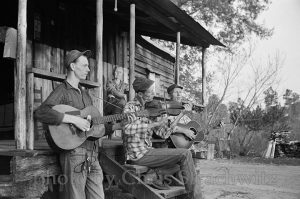
(photo by Chris Strachwitz. All rights reserved)
I went south to McComb to record the Hodges Brothers – real fine mountain boys – I had to return for them since the ex-mandolin player had recently only played guitar and didn’t even have a mandolin anymore but he got one and was very fine when we recorded – on the way back to Jackson it’s all brush and wooded country and snakes and other creatures jump out suddenly in front of your car – if you venture off the main highway you will be reassured that you really are “down South” – with clearances now and then where families grow the food for their own need – where negroes and whites live not far apart but where everywhere the standard of living is extremely low – whole families live in one room shack-like houses but apparently at least most of them owned the little land which they had grabbed from the clutches of mother nature. Due to the humid-subtropical climate the growth is very lush but it is also difficult to keep the land free from nature’s plans.
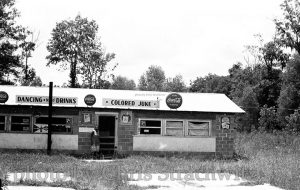
(photo by Chris Strachwitz. All rights reserved)
Back in Jackson I was fortunate enough to be able to go through the entire stock and the records of the Trumpet label – this information I have sent to Record Research and I suppose will appear sooner or later. An interesting discovery was that Elmer James was actually Big Boy Crudup – I had suspected this but was now assured – who lives in Forest, Miss. and is apparently getting little reward for helping Elvis to fame and fortune. While in Mississippi I also passed through Natchez where I tried to locate Suntan Records who positively had recorded Papa George and his washboard and other blues artists – but no trace of this one either.
Finally I was off to Memphis once again – this time to meet with Paul Oliver and his wife Valerie who had flown down from Chicago. We naturally talked mostly about blues and the next day sort of by accident met up with Gus Cannon, Will Shade (Sun Brimmer) and others including Bo Carter. This was a very sad and depressing meeting indeed.
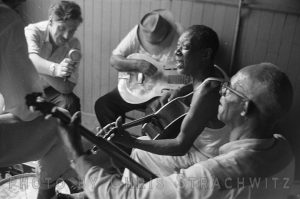
(photo by Chris Strachwitz. All rights reserved)
They had all gathered for a fellow from New York who did not seem to know exactly what he wanted to do but had persuaded them to leave work for the day to record for him – but he was in no way equipped to do any decent recording. The saddest part was the sight of Bo Carter slumped over his guitar, barely able to talk but he was happy to give Paul an interview for the BBC – the music in general was very poor – only individually did Gus Cannon and Will Shade produced some acceptable work.
Back to Clarksdale where all three of us were this time again royally hosted by Wade Walton and his wife and all his many friends who helped us to get a much clearer picture of the negro’s feeling towards the conditions in the South. On through the cotton country passed Parchman’s Farm and to Yazoo City and then Hollandale again to record Sam Chatman. Unfortunately his harmonica player did not show up and his lead guitar man had landed in jail the night before – so there it was Sam Chatman alone with his guitar giving us some of the most remarkable songs I had ever heard – soon to be available on Arhoolie Records.
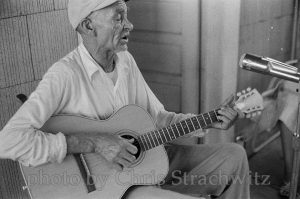
(photo by Chris Strachwitz. All rights reserved)
Across the Mississippi to Arkansas at Greenville – and on to Monroe, La. with one of the ugliest slum sections I have ever seen anywhere – blocks and blocks of shacks on stilts to stay above the water which comes down from the heavens almost daily – no work – and very few musicians – we met Willie Nix who was on his way to California where the cotton season was about to begin. I had a date in Fort Worth and Dallas and so on we went. Lil’ Son Jackson was unable to come up with anything which he had not already done before and everyone was rather frustrated – however while talking about Lil’ Son I want to mention a sax player whom I had met earlier at the yard where Lil’ Son worked – they called him Brother Baer (M.J. Thomas) and he had quite a long musical background – was with Walter Page and the Blue Devils in 1932, with Montague’s Kentucky Serenaders as early as 1930 and recalled the members of the Dallas String Band as Jesse Hooker on clarinet and alto, Marco Washington – bass; Coley Jones mandolin (died ca. 1950) and Sam Harris on piano or guitar depending upon where they played. Brother Baer remembered them “serenading” in the streets of Dallas. Baer also played with Louis Armstrong in 1947 and fairly recently recorded with Lowell Fulson for Checker.
Largely due to Paul’s fantastic preparation for this trip was he able to locate one of the best blues men we recorded during the entire trip. While reading off a list of names from one of his many cards – names of blues singers who supposedly came from the Dallas area or who had at least made many of their records there – John Henry Brent suddenly interrupted Paul and said: “Oh he lives right around here” – it was Alex Moore or better known as Whistling Alex Moore – Paul’s morale was restored and off we went to find him. We were lucky this time – after a hectic day of first locating him, then persuading him that we were not evil, nasty Hollywood exploiters, then trying to find him a suitable place with a piano which took us from a hotel to a music store and finally to a music teacher’s home – the evening finally came to an end with Alex Moore presenting us with some of the most remarkable and exciting music I have ever heard – an amazing performer and a strange personality – his records of the past only give you a glimpse of his abilities and perhaps we didn’t even get a sample of all his talents.
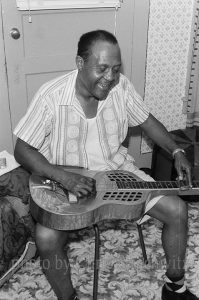
(photo by Chris Strachwitz. All rights reserved)
Then on to Fort Worth – Black Ace was not quite ready for us – we got him new strings for his steel guitar and we happened to buy them in the store where Jimmy Reed had only the night before purchased over three harmonicas – which seems to be his consumption for a week-end gig – he literally blows them all out. I always wondered how he gets that amazing tone.
On to Houston again where Paul and Valerie got a typical welcome from the skies with the streets flooded and Thunder and Lightning all around us – well, we heard Lightning but missed old Thunder!! Mack was again our gracious guide and host – we searched a good deal and recorded pianist-guitarist Jewell Long east of Houston (Paul recorded him) – visited Mance Lipscomb’s brother “Tee” Lipscomb in Galveston and I also had two more sessions with Mance. Mack had located the very fine pianist on the Gold Star disco by Perry Cain by the name of Edwin Pickens who was recorded and interviewed by Paul giving much interesting information about the early logging and turpentine camps and the musicians who used to hang around those places such as Son Becky and Consih Burks.
Once again we went to New Orleans since Paul and Valerie were anxious to visit this one-time center of jazz – we missed a gigantic parade by a few weeks which was to employ no less than six brass bands – but we heard the fine trumpet of Percy Humphrey anyway accompanied by a fine group at the new Absinth House – but the environment is something else!! Plantation days are here again!! Sweet Emma is a fine pianist and the drummer – his name escaped me – he played on the Wooden Joe AM sides – is no doubt the best New Orleans drummer playing today.
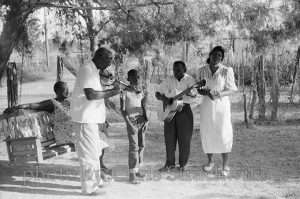
(photo by Chris Strachwitz. All rights reserved)
But off again to Baton Rouge where with the help of Dr. Oster we located a number of fine blues musicians and recorded the wonderful team of Butch Cage and Willie “Preacher” Thomas who had just returned from New Port where they had given the audience some examples of real down to earth country music – they play fiddle and guitar respectively and were two of the nicest people we met – and we had a most fascinating afternoon at their house.
In Crowley, La. we met and talked with J.D. Miller “record man” for the area and also manager of Lightning Slim, Slim Harpo, Lazy Lester, Lonesome Sundown, and other blues and R&R talent. It was on his Feature label that Lightning Slim made his record debut.
Again back to Houston – and finally on to Fort Worth once more to record Black Ace and then to the West Coast – pulling a trailer full of old records and assorted junk.
Well, I hope this short or long report – I’m not sure which applies – has given you some feeling for the trip we took and our accomplishments or lack thereof. I shall write in more detail about some of the individual artists on the album notes or for various magazines – but so much for now – remember Arhoolie Records are for sale at $5 each or join the IBRC and get three for $12.
In the next issue: Blues on the west-coast.
See you later.
An after thought by Chris Strachwitz – July 10, 2017 :
I don’t recall this much driving back and forth – but probably true – I was driving around getting acquainted with this new world like a chicken with his head cut off! The one thing I certainly had no memory of was seeing Clifton Chenier in 1960 with a horribly load band – but I believe it, because I do forget bad things! But thanks to my continued friendship with Lightning (Hopkins) – he drove me in 1964 to hear a very different and wonderful Clifton doing pure blues in Creole French!
Chris Strachwitz – 7-10-17
PS; Tom Diamant just discovered in these old files that in the fall of 1959 and spring of 1960, I recorded K.C. Douglas, and John Hogg but not for Arhoolie, which did not yet exist, but for the International Blues Society.
Want more? You can read about Chris Strachwitz’s 1962 trip by clicking here….
